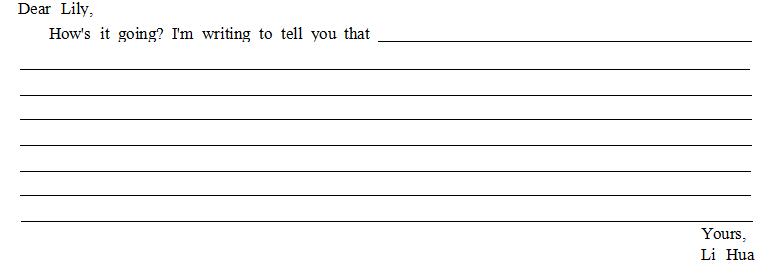2024年高职单招每日一练《英语》1月7日
考试总分:10分
考试类型:模拟试题
作答时间:60分钟
已答人数:661
试卷答案:有
试卷介绍: 2024年高职单招每日一练《英语》1月7日专为备考2024年英语考生准备,帮助考生通过每日坚持练习,逐步提升考试成绩。
试卷预览
-
Passage D
We are all busy taking about and using the Internet. But how many of us know the history of the Internet?
Many people are surprised when they find that the Internet was set up in the 1960s. At that time, computers were large and expensive. Computer networks didn't work well. If one computer in the network broke down,then the whole network stopped. So a new network system had to be set up. It should be good enough to be used by many different computers. If part of the network was not working, information could be sent through another part. In this way, computer network system would keep on working all the time.At first the Internet was only used by the government (政府). But in the early 1970s, universities, hospitals and banks were allowed to use it, too. However, computers were still very expensive and the Internet was difficult to use. By the start of the 1990s, computers became cheaper and easier to use. Scientists had also developed software that made “surfing” the Internet more convenient.Today it is easy to get on-line and it is said millions of people use the Internet every day. Sending e-mails is more and more popular among students.The Internet has now become one of the most important parts of people's life.
1. The Internet has a history of more than _________ years.Afifty
Bten
Cforty
Dtwenty
-
2. — How about putting some pictures into the report?
— ________. A picture is worth a thousand words.ANo way
BWhy not?
CAll right?
DNo matter
-
1. 单句改错,选出括号里的错误选项,并改正。[A](My work) [B](keeps) me [C](busily) [D](all day).
-
2. 前几天,一些同学就英语学习现状进行了一次讨论。发现有如下问题:
1) 对学习英语没有兴趣;2) 记忆单词有困难; 3)怕出错,不敢参与小组讨论;4) 阅读中不知如何处理生词;5) 写作中……
假如你是方华,在英语学习中也遇到了一些类似的问题,你以邮件的形式向英语报社的编辑(Bob)咨询,希望得到帮助。
要求:
1)提出三个英语学习中的问题;
2)可以参考以上提示,也可以根据自己实际适当发挥;
3)中心突出,语意连贯,层次清晰.书写规范;
4)不少于100字,
5)开头和结尾已经给出,不计入总词数。 Dear Bob,
I'm very pleased to write to you, I know you're an expert in English learning. __________________________________________________________
__________________________________________________________
Yours,
Fang Hua
-
从下面选择适当的词填空,完成句子,每词只用一次。
under,behind,below,in front of,near,above,inside,outside,over,across
1. By the end of last month he had swum () the Yellow River four times.
-
2. The teacher stands () the blackboard.
-
1. 假如你是李华,请根据以下写作要点向你的朋友Tom说明自己不能去参加他的生日宴会。 要点如下:1. 感谢邀请。
2. 道歉并说明不能去参加他的生日宴会。
3. 简要说明你不能参加的理由。
(1)奶奶卧病在床需要人照顾。
(2)父母出差去了香港下个月才能回来。
(3)为英语考试准备,须做听力练习。
4. 为不能参加Tom的生日聚会感到抱歉,并祝他生日快乐。 注意:
1.词数:60-80词;开头和结尾已给出,不计入总词数。
2.可以适当增加细节,以使行文连贯。
Dear Tom,
Thank you very much for inviting me to your birthday party.( )
Best Wishes!
Yours,
Li Hua
-
2. 假如你叫李华,你们班同学将于7月2日在学校大厅举办的英语戏剧节表演Snow White and the Sevn Dwarfs,你打算邀请即将到来的美国交换生Lily和你们一起参加表演。请你用英语写一封电 子邮件,告诉她戏剧节的信息,邀请她扮演的角色,以及希望从她那里得到的帮助。参考词语: the English Drama Festival,dwarf(侏儒),role,language,perform
注意:
1. 邮件必须包含上文信息,可适当增加一些内容,使文章通顺、连贯。
2. 邮件不得使用真实的人名、校名。
3. 词数:60—80词
-
1. 单句改错。He,A(on one night),B(played) C(strong) and loud music till 4 o'clock D(in the morning).
-
2. 单句改错。I'd A(like) very much B(come) but I C(have) an exam D(on) Monday morning.
相关试卷
-
2024年高职单招每日一练《英语》1月21日1120人做过
-
2024年高职单招每日一练《英语》1月22日565人做过
-
2024年高职单招每日一练《英语》1月23日1140人做过
-
2024年高职单招每日一练《英语》1月24日1722人做过
-
2024年高职单招每日一练《英语》1月25日1349人做过
-
2024年高职单招每日一练《英语》1月26日1362人做过
-
2024年高职单招每日一练《英语》1月27日383人做过
-
2024年高职单招每日一练《英语》1月28日1982人做过
-
2024年高职单招每日一练《英语》1月29日1869人做过
-
2024年高职单招每日一练《英语》1月30日1076人做过
相关题库